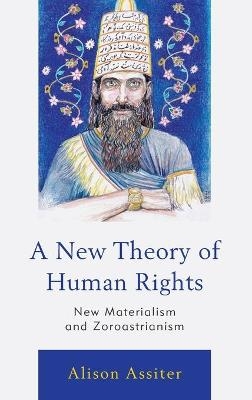
A New Theory of Human Rights
New Materialism and Zoroastrianism
Seiten
2021
Rowman & Littlefield (Verlag)
978-1-5381-4629-3 (ISBN)
Rowman & Littlefield (Verlag)
978-1-5381-4629-3 (ISBN)
The book offers an original defence of a new materialist thesis that focuses on the biological core of humans to develop a theory of human rights.
This book offers a new materialist thesis that focuses on the dynamic biological core of humans, shared with other animals and the rest of the natural world, to develop a radical theory of human rights. It therefore makes a unique contribution to literature and to academic and societal debates both on new materialisms and on human rights.
Many on the political far right deride the concept of a human right. This has occurred in tandem with a growing contempt for the rule of law and for obligations to protect land or the environment, to recognize the rights of minorities, or even to respect the various mechanisms of democracy. On the other hand, ccontemporary ‘left-wing’ inspired literature has also rejected the concept of a human right as Enlightenment inspired and 'western’. This has gone hand in hand with a contestation of ‘essentialism’ and ‘universalism'. These theoretical positions have been variously critiqued as racist, sexist as well as Eurocentric.
Drawing on metaphysics and ethics, with protagonists drawn from traditions across analytic and continental philosophy and feminist theory, Assiter challenges these critics to form a distinctive new materialist position. Most people – defenders and critics - take for granted that the concept of human rights and the universal view of humanity derive from the European Enlightenment. However, this book develops a different story of its origin, from the earlier period of both Aristotle and the Zoroastrian Persian Empire, and locates the concept of a right partly in our biological core, yet challenges the assumption that this is constructed by language of any kind specifically including scientific discourse.
This book offers a new materialist thesis that focuses on the dynamic biological core of humans, shared with other animals and the rest of the natural world, to develop a radical theory of human rights. It therefore makes a unique contribution to literature and to academic and societal debates both on new materialisms and on human rights.
Many on the political far right deride the concept of a human right. This has occurred in tandem with a growing contempt for the rule of law and for obligations to protect land or the environment, to recognize the rights of minorities, or even to respect the various mechanisms of democracy. On the other hand, ccontemporary ‘left-wing’ inspired literature has also rejected the concept of a human right as Enlightenment inspired and 'western’. This has gone hand in hand with a contestation of ‘essentialism’ and ‘universalism'. These theoretical positions have been variously critiqued as racist, sexist as well as Eurocentric.
Drawing on metaphysics and ethics, with protagonists drawn from traditions across analytic and continental philosophy and feminist theory, Assiter challenges these critics to form a distinctive new materialist position. Most people – defenders and critics - take for granted that the concept of human rights and the universal view of humanity derive from the European Enlightenment. However, this book develops a different story of its origin, from the earlier period of both Aristotle and the Zoroastrian Persian Empire, and locates the concept of a right partly in our biological core, yet challenges the assumption that this is constructed by language of any kind specifically including scientific discourse.
Alison Assiter is Professor of Feminist Theory at the University of the West of England. Her most recent book is "Kierkegaard, Eve and Metaphors of Birth", R&L, 2015.
Introduction
Some Defences of Realist Materialism
A ‘New’ Form of ‘New’ Materialism
Moving Towards the Ethical
A Defence of Essentialism and Universalism
A ‘New’ Defence of Human Rights
Eurocentric and Westocentric?
Saba Mahmood
The Politics of Piety
Conclusion
Index
| Erscheinungsdatum | 16.08.2020 |
|---|---|
| Verlagsort | Lanham, MD |
| Sprache | englisch |
| Maße | 162 x 240 mm |
| Gewicht | 458 g |
| Themenwelt | Geisteswissenschaften ► Philosophie ► Metaphysik / Ontologie |
| Sozialwissenschaften ► Politik / Verwaltung | |
| ISBN-10 | 1-5381-4629-0 / 1538146290 |
| ISBN-13 | 978-1-5381-4629-3 / 9781538146293 |
| Zustand | Neuware |
| Haben Sie eine Frage zum Produkt? |
Mehr entdecken
aus dem Bereich
aus dem Bereich
Buch | Hardcover (2024)
Matthes & Seitz (Verlag)
28,00 €
Über konstruktivistisches Denken in der Theologie
Buch | Softcover (2024)
Verlag Herder
58,00 €


